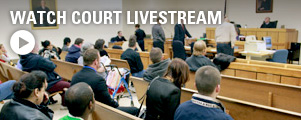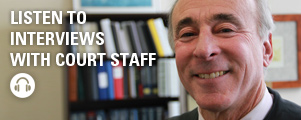“The laboratory of democracy”
We had our long awaited all-court meeting on Wednesday December 15th. The First Session was packed to the gills, standing room only, and Judge Coven told us afterwards that present were public defenders, private lawyers, probation officers, state victim witness advocates, representatives from the prosecutors’ office, the police prosecutors, the DA, the Norfolk Bar Association, and domestic violence advocates’ group DOVE. Massachusetts Supreme Judicial Court Justice Robert Cordy was there, as well as the Norfolk County DA-elect Michael Morrissey. Many, many people have a stake in this and have their eyes on what’s going on. This project, which has up until now felt somewhat abstract, felt all too real the moment all of those people filled that room.
First Judge Mark Coven opened the meeting. He laid down a few “immutable guidelines” for the project: that the video will show no profile shots of the First Judge (himself) and that all shots will be designed to make First Session Clerk Richie Saitta look taller. The courtroom erupted into laughter, howls coming especially from the court officers who sat together in the area usually reserved for defendants coming upstairs from the lockup. On a more serious note, he said that he had always believed in promoting the openness of the court and that he believed that if the public could see what was happening, that they would have more confidence in the judicial system. He also stressed that sometimes the rights of victims of crimes will be protected over the rights of access, and that this was an experiment to find those boundaries and to create a model that could be replicated across the country.
He introduced Justice Cordy, who told of a recent dinner he’d had with retired Supreme Court Justice David Souter where they spent the whole time debating electronic access to the courts. Souter said he’d allow cameras into the Supreme Court “over his dead body.” Luckily for us, Justice Cordy has exactly the opposite opinion. He quoted early 20th century Supreme Court Justice Louis Brandeis as saying that “State courts serve as the laboratories of democracy.’” He went on to say that these laboratories “can be used to try and innovate things that today are new but tomorrow will become what we all accept as important and fundamental in our judicial system.”
Our Executive Editor John Davidow presented our project. He explained that the camera will only be on when a producer is present and emphasized that the project is an experiment with many open questions and that we need the input of everyone involved. And boy did we get it!
The range of concerns went far beyond what we’d been anticipating. While we had anticipated needing to protect the privacy of women coming forward in domestic violence cases, we had not considered the privacy of defendants who were accused of sex crimes against children, one question the public defenders posed. Nor had we considered the possibility of confidential attorney-client discussions being caught on the microphones and broadcast worldwide.
Other thoughtful and thought-provoking questions included: how will a woman with a domestic violence case alert the judge that she wants the camera off without walking on camera? Will someone be monitoring the comments on this blog? Will you make transparent how you are scheduling what cases get shown? How will we make our concerns known after this meeting? What will be the psychological impact of this project on the local community? How will you assess the project? Will proceedings be re-broadcast at a later time?
We came away with just what we had wanted to: a list of concerns from many of the stakeholders of the process and a commitment to holding regular meetings with them to work through the questions and any other ones that will inevitably arise. Read more about our first meeting with a smaller group of stakeholders to talk nuts and bolts about how the project would run.
Judge Coven and Justice Cordy emphasized that this pilot project was a huge opportunity to study what does and doesn’t work about putting the court online and, as it will likely become a model for other courtrooms going forward, everyone’s input can have a huge impact.
We’re all excited to move forward with the project — the great thing about working on a pilot project is that all of the questions and issues that all of the stakeholders have are an integral part of the experiment. See you all after the holidays!











